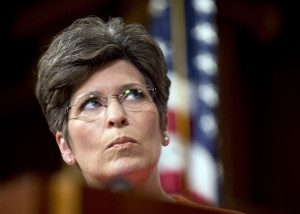
Ernst bill aims to keep agency programs on track
A bill recently passed by the Senate aims to make agency management more accountable for programs that run over budget and behind schedule.
A bill recently passed by the Senate aims to make agency management more accountable for programs that run over budget and behind schedule.
The Program Management Improvement Accountability Act, sponsored by Sen. Joni Ernst’s (R-Iowa), adds senior executive-level program management leaders at every agency. Citing an “epidemic of mismanagement,” Ernst said her bill would send up warning flags when agency programs aren’t meeting their targets.

“This bipartisan legislation puts our federal government back on track by streamlining efforts and outlining strategies to correct widespread deficiencies, lax oversight and unnecessary cost overruns incurred by preventable delays in meeting stated program goals and deadlines,” Ernst said in a statement following passage of the bill. “By adopting widely accepted management standards that are often used in the private sector, these commonsense reforms ensure that taxpayer dollars are safeguarded by increasing accountability throughout the federal government.”
Agency programs leaders will report to a council within the Office of Management and Budget and will review high-risk programs with the Government Accountability Office. The bill tasks Office of Personnel Acting Director Beth Cobert with defining the job requirements for agency program leaders.
In recent years, the federal agencies have shuttered underperforming programs and seen projects fail to meet deadlines.
In September, the Army Corps of Engineers called for more more disciplined leadership at the Department of Veterans Affairs after it found that a half-completed VA hospital in Colorado will cost more than $1.73 billion — more than three times what was previously proposed.
In 2011, OPM closed down its third attempted project to automate federal employees’ retirement claims after spending more than $231 million on the endeavor.
“Agencies continue to have poorly performing projects,”GAO wrote in its 2015 High Risk Report. “Such projects have often used a ‘big bang’ approach — that is, projects are broadly scoped and aim to deliver functionality several years after initiation.”
The bill exempts the Department of Defense from its cost-management mandates, deferring instead to spending as outlined under the fiscal 2016 National Defense Authorization Act.
Sens. Heidi Heitkamp (D-N.D.) and Bob Casey (D-Pa.) co-sponsored the bill.
“By adopting widely accepted management standards that are often used in the private sector, these common sense reforms ensure that taxpayer dollars are safeguarded by increasing accountability throughout the federal government.
The bill now heads to the House, which returns from its Thanksgiving recess Nov. 30.
Copyright © 2025 Federal News Network. All rights reserved. This website is not intended for users located within the European Economic Area.
Jory Heckman is a reporter at Federal News Network covering U.S. Postal Service, IRS, big data and technology issues.
Follow @jheckmanWFED



